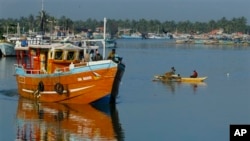The National Oceanic and Atmospheric Administration, or NOAA, Fisheries recently released the final rule establishing the Seafood Import Monitoring Program. The Program establishes the reporting and record keeping requirements needed to prevent illegal, unreported and unregulated, or IUU,-caught and/or misrepresented seafood from entering U.S. commerce, thereby providing additional protections for our national economy, global food security and the sustainability of our shared ocean resources.
The program requires that importers report information and maintain records about key data — from the point of harvest to the point of entry into U.S. commerce — for certain priority species of imported fish and fish products identified as especially vulnerable to IUU fishing and seafood fraud. Similar information for domestically harvested seafood is already reported under a number of existing requirements. Together, these requirements are the first phase of a risk-based traceability program that will eventually cover all species.
“As a global leader in sustainable fisheries management and seafood consumption, the U.S. has a responsibility to combat illegal practices that undermine the sustainability of our shared ocean resources,” said NOAA Administrator Kathryn Sullivan. “We designed this program to further ensure that imported seafood is legally harvested and truthfully represented, with minimal burden to our partners.”
The U.S. will use the existing International Trade Data System to collect seafood catch and landing documentation for the priority seafood species. This data system is the U.S. government’s data portal for all imports and exports.
“This rule is a critical step forward in combating IUU and seafood fraud. It sends an important message to the international seafood community that if you are open and transparent about the seafood you catch and sell across the supply chain, then the U.S. markets are open for your business,” said Catherine Novelli, U.S. Under Secretary of State for Economic Growth, Energy, and the Environment at the U.S. Department of State. “The rule will build on similar global efforts and will provide confidence to our consumers in the seafood they eat while also leveling the playing field for honest fishers across the globe who play by the rules.”












